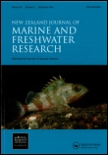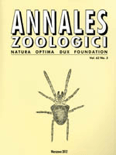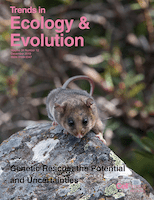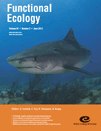
Nature Ecology & Evolution
metrics 2024
Pioneering impactful studies in ecology and evolution.
Introduction
Nature Ecology & Evolution is a premier journal that serves as a cornerstone for cutting-edge research in the dynamic fields of ecology, evolution, behavior, and systematics. Published by NATURE PORTFOLIO, this journal, with the ISSN 2397-334X, emphasizes high-quality, impactful studies that advance our understanding of ecological interactions and evolutionary processes. With an impressive Scopus ranking placing it in the 99th percentile—#6 out of 721 in Ecology, Evolution, Behavior and Systematics and #5 out of 461 in Environmental Science Ecology—it is classified as a Q1 journal, highlighting its significance in the research community. Established in 2016, it continues to foster an open dialogue among researchers and practitioners while facilitating the dissemination of transformative ideas that shape environmental policy and conservation strategies. While access to articles is restricted, the journal's robust impact factor underscores its relevance in scholarly discourse. Researchers, professionals, and students are encouraged to engage with the current trends and discoveries published in this leading journal, which thrives on addressing the challenges and complexities of our natural world.
Metrics 2024
 5.06
5.06 13.90
13.90 16.50
16.50 118
118Metrics History
Rank 2024
Scopus
IF (Web Of Science)
JCI (Web Of Science)
Quartile History
Similar Journals

Annual Review of Ecology Evolution and Systematics
Exploring the Dynamic Interplay of Nature's ProcessesThe Annual Review of Ecology, Evolution, and Systematics, published by Annual Reviews, is a leading academic journal dedicated to advancing the understanding of ecological and evolutionary processes. With a commendable impact factor and impressive rankings—9th in both the Ecology, Evolution, Behavior and Systematics category and the Environmental Science category—this journal is recognized for its rigorous peer-reviewed articles that synthesize research findings across a wide range of topics within the fields of ecology and evolutionary biology. Established in 2003, this annual publication aims to provide researchers, professionals, and students with comprehensive insights into the latest developments and trends within these dynamic disciplines. By facilitating access to high-quality scholarly articles, the Annual Review of Ecology, Evolution, and Systematics continues to play a crucial role in fostering scientific discourse and discovery.

BMC Ecology and Evolution
Championing innovative research in a changing world.BMC Ecology and Evolution is a premier open access journal published by BMC, dedicated to advancing our understanding of ecological and evolutionary processes in a rapidly changing world. With a growing e-ISSN of 2730-7182, this journal serves as a vital platform for researchers and scholars looking to disseminate high-quality research findings that explore the interplay between ecological dynamics and evolutionary developments. Operating from London, England, BMC Ecology and Evolution provides seamless access to valuable research, ensuring that significant studies are available to a global audience without barriers. The journal fosters a collaborative atmosphere, welcoming diverse research methodologies and interdisciplinary approaches, thus making it a crucial resource for professionals, students, and academics alike. Its commitment to open access ensures that pioneering research in ecology and evolution is readily available, encouraging the continuous exchange of ideas and knowledge in the field.

OIKOS
Pioneering research that shapes our understanding of nature.OIKOS is a leading journal dedicated to the field of Ecology, Evolution, Behavior, and Systematics, published by WILEY in the United Kingdom. Since its inception in 1973, OIKOS has established itself as a vital platform for researchers seeking to advance their understanding of ecological interactions and evolutionary processes, with its impact reflected in its prestigious Q1 classification in the 2023 Scopus rankings. The journal's dedication to high-quality research is exemplified by its robust ranking of #106 out of 721 in the relevant categories, situating it within the top 15% of journals globally. With a commitment to disseminating influential findings, OIKOS encourages the open exchange of ideas among a diverse range of scholars, making it an essential resource for academics, professionals, and students alike. Whether you are interested in innovative ecological theories or applied research with real-world implications, OIKOS provides a rich repository of knowledge to inform and inspire your work.

NEW ZEALAND JOURNAL OF MARINE AND FRESHWATER RESEARCH
Unveiling the Secrets of New Zealand's WatersNEW ZEALAND JOURNAL OF MARINE AND FRESHWATER RESEARCH, published by Taylor & Francis Ltd, stands as a distinguished platform for the dissemination of innovative research in the realms of aquatic science and ecology. With an ISSN of 0028-8330 and E-ISSN 1175-8805, this journal has been curating significant scientific contributions since its inception in 1967, continuing through to 2024. Recognized in the Q2 category across multiple relevant fields—including Aquatic Science, Ecology, and Water Science—this journal ranks notably in Scopus, with a 74th percentile for Ecology, Evolution, Behavior and Systematics, highlighting its impact and relevance within the scientific community. Though not an open-access publication, its rigorous peer-reviewed articles offer insights that resonate with researchers, professionals, and students who are passionate about advancing our understanding of freshwater and marine ecosystems. By fostering a collaborative space for ecological and environmental inquiries, the NEW ZEALAND JOURNAL OF MARINE AND FRESHWATER RESEARCH is essential for those aiming to contribute to the vital conversations around biodiversity, conservation, and sustainable management of aquatic resources.

Journal of Fish and Wildlife Management
Innovating wildlife management for a sustainable tomorrow.The Journal of Fish and Wildlife Management, published by the U.S. Fish & Wildlife Service, serves as a vital resource for scholars, researchers, and professionals in the fields of Animal Science, Ecology, and Conservation Biology. With its ISSN 1944-687X, this esteemed journal has been disseminating critical research findings since 2010, contributing significantly to the understanding of fish and wildlife conservation practices and their ecological impacts. Despite its Q3 category rankings in various disciplines as of 2023, it provides a platform for innovative research that influences policy and management strategies for biodiversity conservation. The journal, although not open access, remains committed to advancing the scientific discourse surrounding wildlife management with articles that emphasize practical conservation efforts and ecological sustainability. Readers can expect a diverse range of articles that promote best practices in the management and conservation of fish and wildlife resources, furthering our collective mission of preserving ecological health and biodiversity for future generations.

Evolutionary Biology
Advancing Knowledge in Evolutionary SciencesEvolutionary Biology is a distinguished academic journal published by Springer, focusing on the intricate fields of ecology, evolution, behavior, and systematics. This journal, with the ISSN 0071-3260 and E-ISSN 1934-2845, has established itself as a critical platform for cutting-edge research and innovative ideas that shape our understanding of biological evolution and its implications. Operating from Germany, it ranks in the Q2 quartile in its category for 2023, placing it in the top tier of journals recognized for quality and impact, with a Scopus rank in the 66th percentile among its peers. Despite not being Open Access, this journal ensures comprehensive dissemination of knowledge essential for researchers, professionals, and students passionate about evolutionary studies. With a publication history tracing back to 1993 and converging years up to 2024, Evolutionary Biology continues to significantly impact the academic landscape, fostering dialogue and collaboration across various disciplines within the biological sciences.

ANNALES ZOOLOGICI
Fostering Insights into Animal Behavior and SystematicsANNALES ZOOLOGICI is a distinguished academic journal published by the Museum & Institute of Zoology, Polish Academy of Sciences, based in Warsaw, Poland. With a long-standing tradition in zoological research, this journal has evolved to encompass a diverse range of studies in ecology, evolution, behavior, and systematics, aiming to foster a deeper understanding of animal biology and conservation. It holds a commendable Q2 classification in the 2023 Ecology, Evolution, Behavior and Systematics category, indicating its significant contribution to the field. Although ANNALES ZOOLOGICI is not an open-access publication, it remains accessible to a global audience of researchers, professionals, and students aiming to advance their knowledge and engage with cutting-edge zoological findings. As of 2024, this journal continues to be a vital resource for those eager to explore the complexities of animal life and contribute to ongoing discussions within this essential scientific discipline.

Science of Nature
Advancing Multidisciplinary Insights into Nature.Science of Nature, a prestigious journal published by SPRINGER HEIDELBERG, stands at the forefront of multidisciplinary research, encompassing key areas within Ecology, Evolution, Behavior, and Systematics. With an impressive history tracing back to 1913 and a continued focus on innovative scientific inquiry, this journal has earned a commendable Q2 ranking in both Ecology and Medicine as of 2023. The journal is accessible through its Open Access options, promoting wider dissemination of knowledge and research breakthroughs. As a vital resource for researchers, professionals, and students alike, Science of Nature not only reflects the dynamic nature of biological sciences but also contributes significantly to advancing our understanding of complex ecological relationships and medical developments. Recognized by its ISSN 0028-1042 and E-ISSN 1432-1904, this journal is a must-read for those seeking to stay updated with the latest findings and discussions in the field.

TRENDS IN ECOLOGY & EVOLUTION
Unveiling the Latest Trends in Nature's DynamicsTRENDS IN ECOLOGY & EVOLUTION, published by CELL PRESS, is a premier academic journal dedicated to the dynamic fields of ecology, evolution, and behavior. With its ISSN 0169-5347 and E-ISSN 1872-8383, this prestigious journal has consistently contributed to the scientific community since its inception in 1986 and is set to continue its legacy through 2024. Ranked in the top quartile (Q1) of its category in 2023, TRENDS IN ECOLOGY & EVOLUTION holds an extraordinary position, sitting at rank #4 out of 721 in the Scopus database for Agricultural and Biological Sciences, specifically within the Ecology and Evolution sectors, reflecting its high impact and relevance in these critical areas of study. The journal's objective is to provide a platform for reviewing and synthesizing the latest research, trends, and advances, thereby influencing the direction of future scientific inquiries. Although it does not currently offer open access options, its insights are invaluable for researchers, professionals, and students eager to delve into the rapidly evolving understanding of ecological and evolutionary processes.

FUNCTIONAL ECOLOGY
Advancing Ecological Insights for a Sustainable FutureFUNCTIONAL ECOLOGY is a premier journal published by WILEY that delves into the intricate relationships of organisms and their environments, addressing key themes in ecology, evolution, behavior, and systematics. Established in 1987, this influential publication has made strides in both foundational research and applied science, boasting a remarkable impact factor that positions it in the Q1 category for Ecology, Evolution, Behavior, and Systematics. With a Scopus ranking of #48 out of 721 in its field, it represents the cutting edge of ecological research, appealing to a diverse audience that includes researchers, professionals, and students striving to comprehend and address ecological challenges. Although the journal does not currently provide Open Access options, it remains a vital resource for those looking to deepen their understanding of functional ecology and its practical applications in sustainability and conservation. Join the community of scholars advancing ecological knowledge and its relevance in today's rapidly changing world.